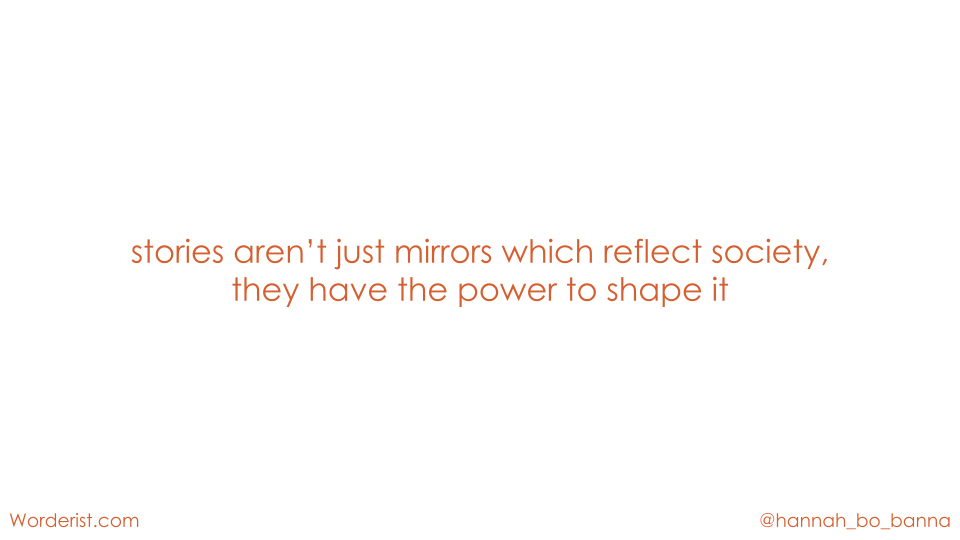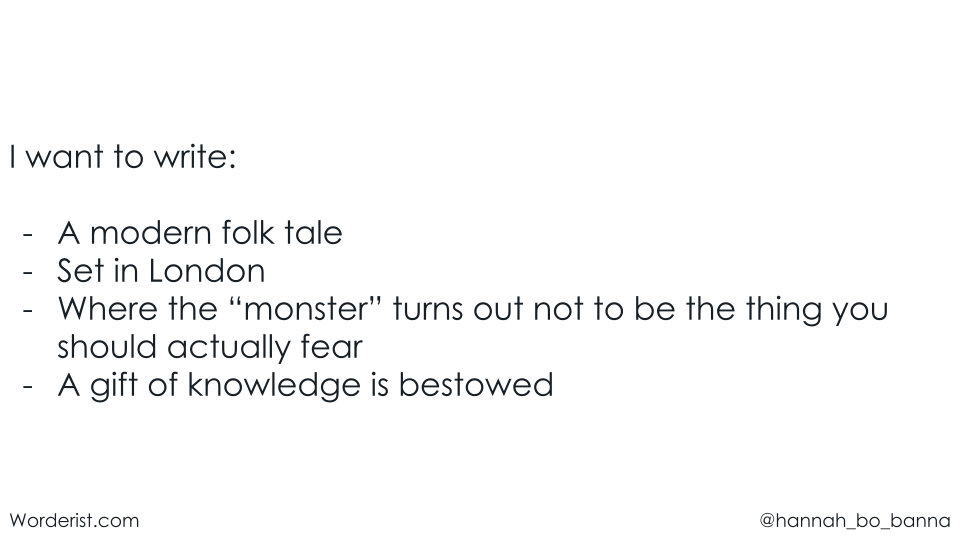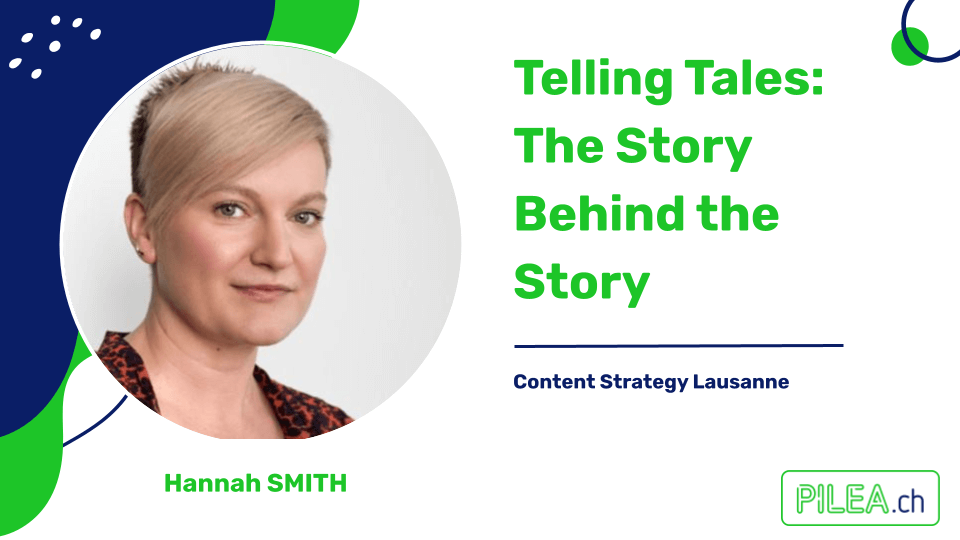You find here my personal take of the Content Strategy Lausanne meetup with Hannah Smith. During nearly two hours we discussed writing fictions and the impact of stories on the reader and society.
Content Strategy Lausanne is a local meetup that I started when I was writing for products within a web agency. UX writer, Content Strategist and Web writers are a rarity in Switzerland, I wanted to connect with peers. The meetup started with us watching InVision Webinars, sharing interesting reads and our personal summaries of books about Content Strategies and UX Writing. The presentations blended into sharing a drink and a conversation. Social distancing due to COVID pivoted Content Strategy Lausanne meetup to online meetings, which allowed the meetup to grow internationally.
Telling Tales: The Story Behind the Story
Where do stories come from? And why do we write them at all? In this meetup, Hannah Smith shared some of her own fiction writing, and the story of how that story came to be. She shared why she writes, what inspires her, her processes, plus some things she’s learned about writing along the way. This article is my very personal and partial take on Hannah’s presentation.
When I invited Hannah to join Content Strategy Lausanne meetup as a guest speaker, we discussed stories and storytelling with a literature angle. Hannah writes a weekly beautiful newsletter that connects me with a literary part of my being that has little place in my daily life in the current phase of my life. To be honest I have grown weary of the use of the concept ‘storytelling’ in digital marketing, branding and design. As much as I love storytelling, I cannot read any more articles titled ‘The 7 best storytelling tips to create a brand experience’! Discussing storytelling and writing stories with Hannah made me happy. I expected there were other people in the Content Strategy Lausanne community who would be happy to discuss with her. I also planned this meetup as a gift to myself, a space to be inspired before the summer instead of a webinar were I feel I HAVE to memorise and learn. I bottled the inspiration I found with Hannah and you during this meetup, for the warm and slow summer afternoons where I will be free to let my mind wander and my pen write.
A discussion meetup: slides available but no recording
The meeting with Hannah Smith was a discussion rather than a one way knowledge broadcast. After Hannah’s presentation, participants were free to turn on their video and microphone to discuss and share. For this reason, you won’t find a recording of the meetup. Opinions and ideas are not mine to publicly publish. I wish to create an environment where you feel comfortable sharing. I feel like recording and publishing a recording on Youtube would defeat this purpose.
Hannah kindly agreed to share her slides with the Content Strategy Lausanne community. Please, get in touch with me isaline@pilea.ch and ask for them.
Who is Hannah Smith, our guest speaker?
Hannah Smith is a creative content consultant and writer at Worderist. Hannah’s impressive experience in marketing includes working for famous agencies such as Distilled and Verve Search before she started her own consultancy Worderist. Her work for clients has won multiple awards, and she’s spoken at numerous conferences including MozCon, SMX, SearchLove, and BrightonSEO.
After stumbling upon some of Hannah’s slides about inspiration thanks to Areej Abuali, founder of the community Women in Tech SEO, I started following Hannah. “Manufacturing Serendipity”, Hannah’s newsletter, best represents her to me. She is incredibly talented, witty and inspiring. Her newsletter is a wonderful gathering of readings, thoughts and art.
➡️ Sign up: https://worderist.com/newsletter/
I particularly enjoy Hannah’s newsletter because her sharing and thinking connects me with my literary self. I love my work and the matter-of-factly quantifiable aspect of SEO. However, earlier in life, I enjoyed philosophy and literary history classes.
Motivation of the artistic creation
Why do writers write? asks Hannah. Writers write for complex and multiple reasons. Like Hannah, one might feel the need or motivation to write. Hannah mentions also that she writes to make people feel something, to capture people’s imaginations, to help people gain new perspectives, and to make people think.
Bisa Butler, quoted by Hannah, combines portraiture and quilting, to accord dignity and respect to her Black subjects—those she discovers in historical photographs, as well as members of her own family. The creation gives a shape, an existence to the persons Bisa represents in her creation.
We didn’t discuss it during the meetup, however I think there is something cathartic in the action of writing, or any other artistic creation. Putting words on paper personally helps me create a distance between me and reality. This distance helps me get perspective. I sometimes rewrite the situation from someone else’s perspective to give me a better understanding. In other words, my analysis brain is activated through the action of writing. Through writing feelings become experience and knowledge. Though the initial intent isn’t to create a text that I want to publish, the idea that it will be read still lingers in my head. Also I use this type of journaling as a gathering of material for other writing.
Stories shape society
Stories are not just mirrors, they contribute to shaping society. Stories told to children shape their perspective of actions and behaviour. Hannah mentions folk tales such as Perrault’s Little Red Riding Hood, Puss in Boots and Cinderella. Folk tales were traditionally shared orally and meant to teach the audience a moral. Charles Perrault was the first person to publish many of these folk tales in print.
In Little Red Riding Hood, the story teaches children to stay in the path or be held accountable for misfortunes happening because of them not following the rules. In other words, the Big Bad Wolf is not held to account for his actions, the victim is blamed rather than the perpetrator of violence (the Wolf).

With various examples, Hannah showed how stories teach us behaviours that serve others, but don’t necessarily serve us. Stories are told, remembered and shared. Hannah’s presentation reminded me that folk tales contributed to creating what we call in French sociology and philosophy the Doxa. The Doxa is a set of opinions and ideas that are without debate in a given society. Opinions part of the Doxa of a given society are self-evident: they are not open for discussion, there is a general agreement that says ‘this is right’. Basically, the Doxa represents the mainstream public opinion.
Hannah’s presentation also reminded me of past history classes. I remember something like critical history classes, where I learned that History is an interpretation of facts. Writing history is providing an approach to reality, the person who writes history has the power to choose the words – and their underlying meaning – and the way and event is told. What we chose to remember matters. To understand a past reality, an historian will gather a cluster of evidence and material from different sources.
The process of writing a story
Hannah read one of her own short story named ‘The Knock Knock Man’ and shared a creation process. I found the most interesting that Hannah’s starting point was not ‘I have a story to tell’ but rather her favorite genre, a familiar place, a type of character and her desire for a story that offers a gift of knowledge.

Analysing her own work, Hannah shared the liberty she took with the genre she chose. For example, her choice of writing in the first person instead of using omniscient narrators. Her choice of narrator prevents her from providing additional knowledge to the reader and thus partly shadows the complexity of the situation of the story’s characters.
Bits of the conversation that followed Hannah’s presentation
Erich, who writes a lot in the horror genre, found a strong overlap between the genre of fairy tales, folk tales and horror. Horror stories often have a cautionary or educational aspect to them as well—to the point of some of them being occasionally hijacked with deep-rooted sexism and other -isms. Erich also kindly shared how setting himself deadlines helps his own process for fiction writing. A bit of “art through adversity” if you have to create against a time constraint he says.
Together we discussed the processes of writing and rewriting stories. Hannah rewrites up to 30 of 40 times a story, for example taking another character’s point of view of the event. We agreed that there is no good place of bad place to write or not good way or bad way: the most important is to sit down and take the time.
Short stories are an interesting format to explore because of the limited number of characters. The writer has to carefully choose what information to share and how. Whereas novels ask for a high level of commitment.
Thank you Hannah
Thank you Hannah for creating this amazing presentation and for sharing a personal short story with us. The rhythm of the presentation itself felt like a story. Hannah has the ability to take a listener on a journey. Her tone of voice as well as her choice of words both share knowledge and open up to personal thinking. This is what I enjoy most about what I read from Hannah – such as her newsletter – her writing connects dots and ideas.
I admire Hannah for how brave it was to read a personal short story. She put herself out there. I was also very impressed by how genuinely and honestly Hannah answered the questions and discussed with us. Many thanks to Hannah and to each of the participants. I had a wonderful time that filled me with energy. Finally, thank you Hannah for giving me inspiration to write this blog article. I had fun letting my fingers flow on my keyboard.

